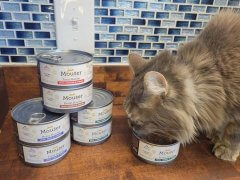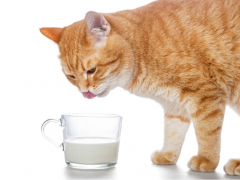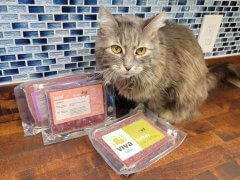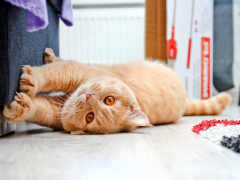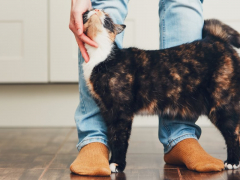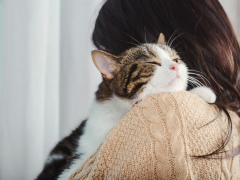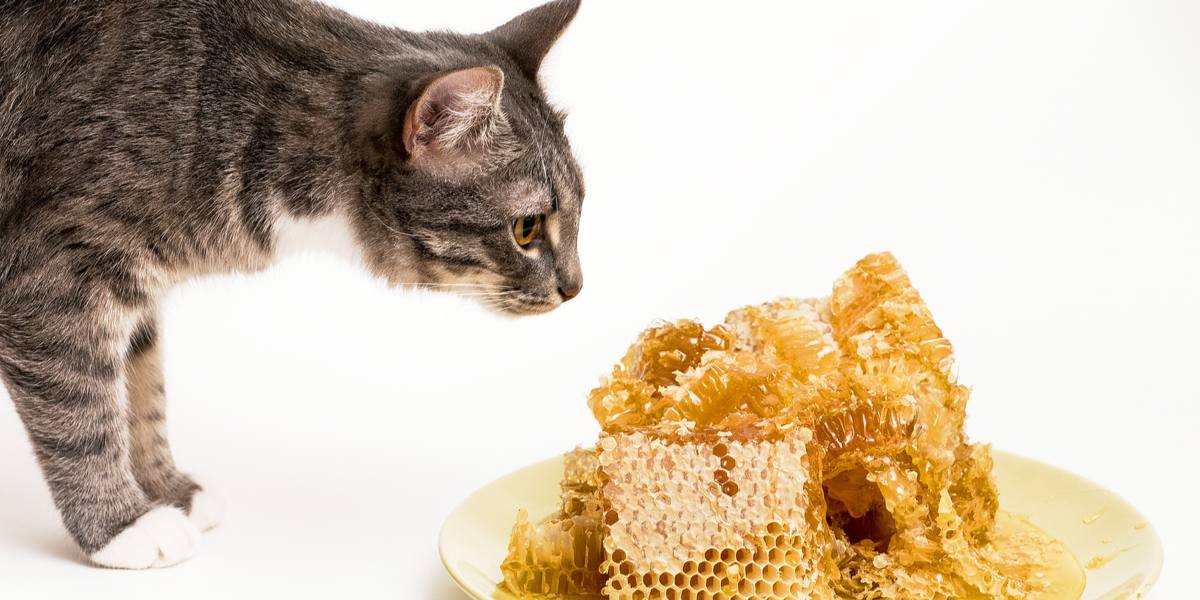
Honey is a versatile, sweet-tasting food that is commonly eaten alone or used as an ingredient in various recipes. It’s made by bees from the nectar of flowering plants, and there are several varieties with a range of flavors and textures.
We often add honey to food for flavor and sweetness, but can cats eat honey? The answer is no, cats cannot eat honey. Even though honey isn’t toxic to cats, its risks outweigh any benefits it could offer.
Although honey tastes delicious and offers great health benefits to humans, the same doesn’t apply to cats. Honey offers them no nutritional value and can increase their risk of weight gain and diabetes or cause an upset tummy.Quick Overview: Can Cats Eat Honey?





Summary of Content
Benefits of Honey for Cats
Honey has no nutritional benefit to cats compared to humans. Honey is thought to be a healthy alternative to refined sugars and is often used to help soothe a sore throat or cough in humans. Some studies even show that consuming local honey can reduce seasonal allergy symptoms and prevent allergic reactions.
Honey is packed with antioxidants and has natural antibacterial properties and anti-inflammatory properties, and medical-grade honey is frequently used to aid wound healing and treat skin infections.
Raw honey tends to be better than processed as it contains more nutrients. While this all sounds great for humans, unfortunately, these same benefits do not apply to cats.
It’s also important to remember that cats are obligate carnivores and their digestive system is designed to digest mostly meat. Additional foods can add variety to their diet and make tasty treats, but honey offers your cat little to no nutritional value.
That said, medical-grade manuka honey is still very commonly used in veterinary medicine to assist wound healing, but you should always speak to your vet for advice before applying any medication, creams, or honey to your cat’s skin.
Also Read: Allergies In Cats: Causes, Symptoms & Treatments
How Much Honey Can a Cat Eat?
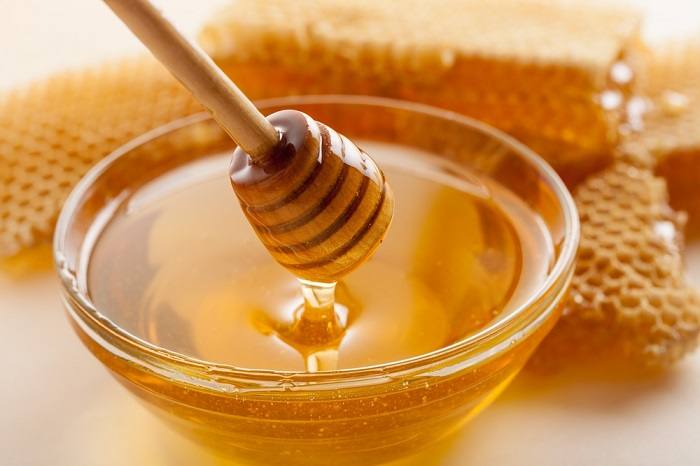
Cats should not eat honey as it provides no nutritional benefits and may cause stomach upset in large amounts.
Feeding honey to cats is not advisable. Its high sugar content is not particularly safe for cats as it raises their insulin levels, and it can give them an upset tummy. If your cat licks a teaspoon of honey from your spoon, it won’t do them any harm, but they should never have more than this.
How Often Can a Cat Eat Honey?
If your cat licks a little bit of honey every once in a while, it won’t cause any harm. However, honey should not feature regularly in your cat’s diet as it is not healthy for them, and they don’t particularly like the taste.
Is Honey Used in Commercial Cat Food?
No, honey is not used in commercial cat foods. Honey contains a lot of sugar, which can increase a cat’s risk of developing diabetes. Honey also has no health benefits for cats, and they cannot taste sweet foods.
The Risks of Eating Honey for Cats
Despite being sweet and delicious, and having numerous health benefits for humans, eating honey has some risks for your feline friend.
A tiny amount of honey will not cause your cat any harm, but if they have too much, it could cause an upset tummy. You might notice some vomiting, diarrhea, or abdominal pain. Honey can also contribute to weight gain and increase the risk of obesity and diabetes as it has such a high sugar content.
Cats cannot tolerate the same levels of sugar in their bodies as humans and eating honey could cause an insulin spike as it raises their blood sugar levels very high. Diabetic cats definitely should not eat honey as it will raise their glucose levels too high.
You should never allow a kitten to eat honey. Just like in human babies, there is a real risk of developing botulism from honey. Honey contains bacterial spores, and kittens are particularly susceptible to this condition because their immune systems are still developing. The bacteria Clostridium botulinum releases a neurotoxin into the bloodstream, leading to severe and life-threatening illness.
Also Read: Feline Diabetes: Diagnosis, Treatment, and Remission Demystified
Other Foods Containing Honey
Honey is frequently used to sweeten and add flavor to a range of foods. Generally, these foods are not safe for cats to eat either, as they are sweet and can contribute to weight gain or increase the risk of diabetes.
Honey roasted turkey or human-grade honey ham is OK to feed to cats in tiny quantities, and most cats will go crazy to get their paws on meat. But any more than a mouthful is too much. Foods such as Honey Nut Cheerios, honey buns, and honey-vanilla Greek yogurt offer no nutritional value to cats and contain too much sugar.
Also Read: What Is Human-Grade Cat Food and How It’s Different
Honey roasted peanuts could be a choking hazard, while the taste of honey mustard is probably very unappealing to your cat! As a rule, avoid feeding your cat any honey-flavored treats from your cupboards.
Signs Your Cat Has Eaten Honey
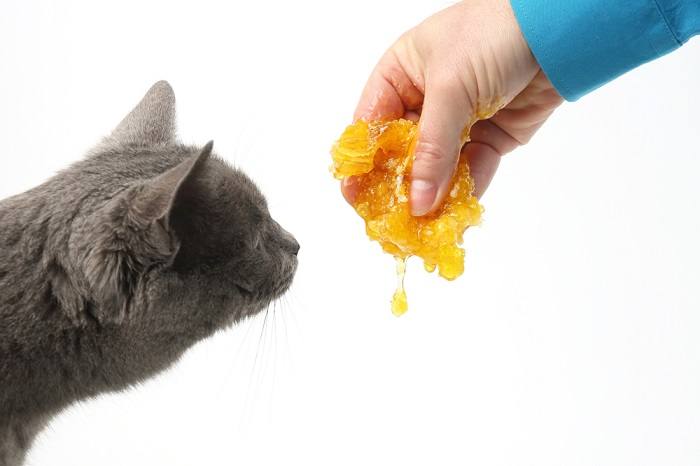
Signs that your cat has eaten large amounts of honey include vomiting and diarrhea.
If your cat has only eaten a small amount of honey, chances are they will be just fine, and you won’t notice anything unusual. However, any amount of honey, and particularly a fairly large amount of honey, can cause an upset tummy. Vomiting, diarrhea, and stomach ache are common signs that your cat has eaten honey.
If a kitten eats honey, there is a risk of them developing botulism as their weaker immune systems are susceptible to the bacterial spores in honey. This is a rare condition, but the symptoms can include lethargy, weakness, vomiting, diarrhea, loss of appetite, depression, dehydration, and paralysis. This is a serious and life-threatening illness that needs prompt medical treatment.
If your cat has eaten honey and you notice any of these symptoms then you should contact your vet for advice.
Also Read: 15 Human Foods That Are Poisonous & Toxic To Cats
What Happens if Your Cat Eats Honey?
Most cats are fine if they eat a little honey. However, they might develop an upset tummy with some vomiting or diarrhea. This usually clears up with symptomatic treatment, which might include an injection of an anti-vomiting drug at the vet and a temporary bland diet of plain cooked chicken or fish.
If a kitten eats honey and is unlucky enough to develop botulism, prompt treatment is essential. Although this is a very rare condition, it is serious, and the kitten will need to be hospitalized at the vet and treated with aggressive antibiotic treatment, IV fluids, a feeding tube to deliver essential nutrition, and oxygen therapy.
With early treatment, cats can recover from botulism within a few days, but if left too long the prognosis can be guarded to poor, so it’s essential to get your kitten to the vet straight away if you think they might have eaten honey.
Do Cats Like the Taste of Honey?
Cats don’t like the taste of honey. As carnivores, not only do they prefer the taste of meat or fish, but they actually can’t really taste sweet foods. This means they won’t experience that distinctive sweet taste of honey.
Final Thoughts
Although honey tastes delicious and offers great health benefits to humans, the same doesn’t apply to cats. Honey offers them no nutritional value and can increase their risk of weight gain and diabetes or cause an upset tummy.
Any other foods flavored with honey will be too calorific for cats to eat and should also be avoided. Although most cats are fine if they eat a tiny bit of honey, there are lots of other, safer tasty treats out there to offer your feline friend!
Also Read: Best Cat Food For Weight Gain
Frequently Asked Questions
Is it OK for cats to eat honey?
Cats shouldn’t eat honey, as it has a very high sugar content that can cause weight gain and sickness. Honey also offers cats no nutritional benefit as cats get most the nutrition they need from meat and fish as they are obligate carnivores.
Why is honey bad for cats?
Honey is very sugary and caloric, which can lead to weight gain and diabetes, as well as cause an upset tummy. If your cat gets their paws on a tiny bit of honey it shouldn’t cause them any harm, but it shouldn’t feature in their diet. Kittens can be susceptible to botulism if they consume honey.
Can cats get sick from eating honey?
Yes, honey can cause a mild upset tummy in cats. In kittens, it can also cause botulism, although this is rare. A tiny lick of honey is unlikely to make your cat unwell, but more than this could make them sick.
Why can’t cats taste honey?
Cats are actually unable to taste sweet foods, so won’t enjoy the sweet flavor of honey. They are obligate carnivores, so have a preference for meat and fish-based flavors.
